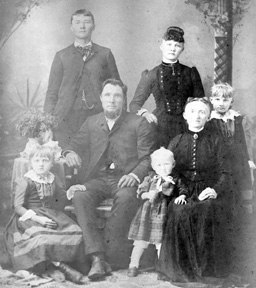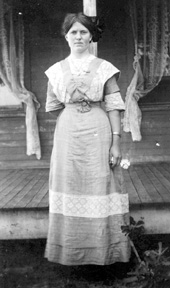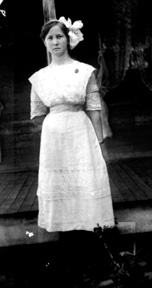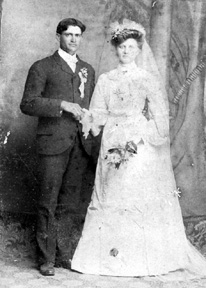Swiss Alp
FAYETTE COUNTY, TEXAS
Swiss Alp
Swiss Alp is one of the most picturesque and fertile sections of the county. The rolling prairie is studded with elegant residences surrounded by gardens and trees. The blackland is very rich and productive; the population well-to-do, substantial farmers; they are progressive Germans. It is a comparatively new country, situated on the Fayette county school lands, about eleven miles from La Grange and seven miles from Schulenburg. it is a voting precinct of the county and a postoffice. Geo. Vogt and Chas. Bruns are popular young merchants of Swiss Alp; L. C. Melcher, the proprietor of one of the finest gins in the county. There is also a blacksmith shop. It was settled in the seventies. Among the first settlers are Chris Steinmann, A. Franke and Mrs. Auguste Bolling. At Swiss Alp there are large bone deposits, found especially in Mr. Knigge's pasture. They have been described by Mr. L. C. Melcher in his essay on minerals of the county.
Footprints of Fayette article by Sherie Knape:
Swiss Alp Church
The community of Swiss Alp dates back to approximately 1865, when a few Lutheran families settled in the area. A year later, eight Wendish families moved from Serbin and settled near the East Navidad River. IN 1867, Mr. C.C. Rudi, a teacher at Serbin, agreed to relocate to establish a school and church in Swiss Alp. On March 24, 1867, a congregation was organized and named "The Philadelphia Evangelical Lutheran Church" with members meeting in private homes for services. On March 29, 1869, Mr. & Mrs. John Knippa deeded 10 acres of land for the construction of a church/school building. The building contractors for the first church were J.C. Melcher and Mr. Klinglemann. Cedar logs were donated by George Knippa and J. F. Melcher and hauled many miles. On February 18, 1877 land was set aside behind the church for a cemetery. The congregation bought 44 1\2 more acres on November 6, 1877. The first parsonage was built in 1879. In 1887 the church school was closed. The old log church was sold in 1889 and a new church was built. C.L. Melcher was the contractor for the church and it was dedicated January 12, 1890. In 1891 a church bell was given in honor of A.F. Gebert.
The first pastor of the church, C.C. Rudi left the congregation in 1877. Several pastors came and went until Pastor Carl Kern came in 1890 and stayed until 1921. Over the next 20 years many changes took place in the congregation: Sunday school classes, women's organizations, and youth groups were all organized. On January 26, 1942, additions to the present church were made. A transept on the north and south sides and an extension to the back were completed, this making the church into the form of a cross.
The difficulty of maintaining three separate Lutheran congregations in such a small area led to the merger of Trinity Evangelical Lutheran Church of Black Jack Springs; and Salem Lutheran Church of Freyburg; with the Philadelphia Evangelical Lutheran Church, Swiss Alp. On May 14, 1967, the new congregation was renamed "United Evangelical Lutheran Church of Swiss Alp".
At the present time, to the north of the church is the Sunday school building that was formerly the Washington school. The old Salem Lutheran Church building serves as the church fellowship hall and houses the historical room. This room is fashioned from old ironwork from the Black Jack cemetery and contains relics as well as current church history. The two altars in the exhibit are from the Black Jack Church and the Salem Church. The congregation presently numbers around 200.
Footprints of Fayette article by Edward F. Janecka:
Swiss Alp Dance Hall
If you were a young adult growing up in Fayette County and surrounding areas in the 1930's, 40's, 50's, 60's, 70's and early 80's, you no doubt spent some time at the Swiss Alp Hall. In 1933, Henry Tietjen moved his family from Rutersville and purchased the Swiss Alp Store and farm from August Brune. Along with purchasing the store, he also purchased the dance hall, which he enlarged that year. As the hall grew in popularity, people came from all around and bands would travel from all parts of the area. One band from the Willow Springs area called "Lindy's" had a certain piano player named Marian Lindemann. This was her father's band and they played at Swiss Alp frequently. She met and fell in love with Egan Tietjen and they eventually got married. It wasn't long before World War II broke out. While Egan was on the banks of the English Channel aiming 90-millimeter guns at German buzz bombs, Marian was back home milking cows, raising chickens and helping her father-in-law Henry run the business.
After Egan came back from the war, they continued the dairy and the store but the dance hall took on more importance. During the 40's and 50's, there were a number of different bands that played at Swiss Alp including Bill Cornelson, Adolph Hoffner and his Pearl Wranglers, Jurecka's, Bob Wills and the Texas Playboys, Joe Patek, Johnny Holub, John Baca, Rudy Kurtz and many others. Swiss Alp was an interesting hall in that there was an area on the right hand side of the band stand where parents and other observers could come and watch the dancing without having to pay and to the left side of the stage was an area called the "bull pen" where men who didn't want to dance could stand and watch the goings on. In the 50's and early 60's, the custom was that the men would all stand in the middle of the hall and when they wanted to dance with a certain girl they would tap the man on the shoulder and then they would get a chance to dance with the young lady. With the 1960's came a new era, the era of rock and roll. The Tietjen's made a decision to book rock and roll bands because they felt the young people needed some place to go.
In the 1960's and 70's, Swiss Alp became the place to go in Central Texas with kids coming from all around this part of the State, and as in the case with young people, sometimes what happened on the football field Friday night carried over to the dance on Saturday. There was an occasional altercation between Smithville and La Grange and Weimar and Schulenburg but the situation was always under control. Deputy Sheriff Lawrence Adamcik, Constable James Stanzel and Constable Ovie Roensch were around to keep things in check and make sure that everyone had a good time. The bands that played were some of the best with B. J. Thomas and the Triumphs, Johnny Williams and the Jokers, Freddie Koenig and the Jades, Roy Head and the Traits, Johnny Winters, Dean Scott, the Barons, the Moods, the Velvets, the Continentals, the Tel Stars. Later in the 70's and early 80's the popular bands were Jeff and the Kickers, Cabin Still, Redwood and Dulwich Fox, Texas Pride, Tom Lively and the Profits, the Drifters, Sun Down, Southern Wind, Gold Dust and the First Coming and many, many more.
Mrs. Tietjen remembers one New Years Eve when the Barons were playing. She said, "we had a crowd of over 1,300 people". Swiss Alp truly was a wonderful place to go and enjoy your youth. I can still remember those wonderful hot dogs and trying to make sure you found a girl to dance the last slow song before intermission. If you sometimes feel discouraged about the youth activities of today, it would be nice to go back into time and see the youth that were at Swiss Alp then. It would be hard to believe that most are now respected members of society. Some became doctors, bankers, lawyers, county judges, district judges, district attorneys, state representatives and senators and even a state comptroller.
Footprints of Fayette article contributed by Stacy N. Sneed:
Swiss Alp Town Is A “Mystery”
14 Dec. 1959 Dallas Morning News article by Frank Tolbert
Swiss Alp, Texas, is a neat community in Fayette County on the road between La Grange and Schulenburg. It is in rolling, cinnamon-colored rangelands. There’s not a mountain insight. Neither could I find a single Swiss living in Swiss Alp.
“Folks around here are mostly Czech or German descent, from families who settled in Fayette County more than a 100 years ago,” said the mayor of Swiss Alp, Egon Tietjen. Mr. Tietjen, a husky sandy-haired young fellow, said he didn’t know exactly how Swiss Alp got its name (the history of Fayette County doesn’t tell, either) but he said there is a legend that the first settler was from Switzerland and so named the community because he saw a resemblance in Fayette’s low hills to his native Alps (the old pioneer must have been on the jug).
“Old Benno Carby might be able to tell you how Swiss Alp got its name,” said Mr. Tietjen. “Old Benno is 89 and the senior citizen hereabouts. He lives down the road.”
Mr. Carby turned out to be a shrewd, kindly-looking, wiry fellow with a drooping, gray mustache. He was washing his hands in a tin pan out in the yard by his big, old frame ranch house on a hill a mile south of Swiss Alp. It was early morning and Mr. Carby was washing his hands before milking the cows. He is a little hard of hearing and I had to
shout my question: “Who was the early settler who named Swiss Alp?”
Mr. Carby smiled behind his huge mustache and continued to soap his hands and he answered: “That Swiss man left here before I was born. If I ever know his name, I’ve forgotten it. My wife could tell you, if she was still alive. She was interested in Fayette County History, God bless her.”
So I said good-bye to an 89 year old man who had to get to his milking. And I drove away with the mystery of Who-Named-Swiss-Alp still unsolved.Note that the obituary of Heinrich Seeburger on this web site states that, as the first postmaster of Swiss Alp, he named the community for his homeland. He was appointed postmaster August 27, 1877.—RAJ
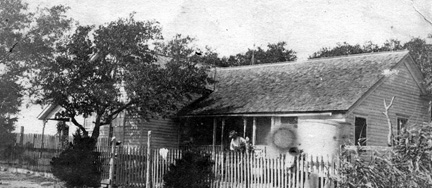 |
|
Gerhard Meyer FamilyStanding: Fritz & Sophie (children of Gerhard's first wife) and Hertha Meyer
|
Gerhard Meyer HomeMeyer photos contributed by Mike Gohlke |
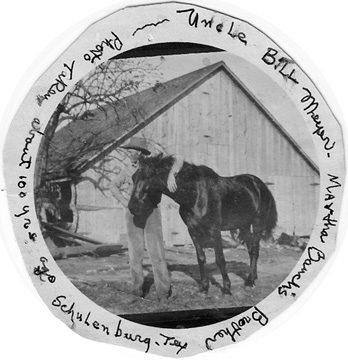 |
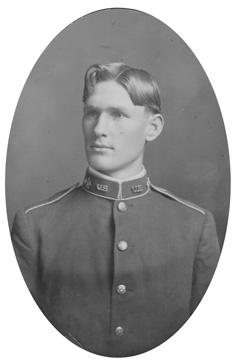 |
William Meyer |
William Meyer during WWI |
Daughters of Gerhard Meyer
Hertha
Maggie
Charles Bauch & Martha Meyer (1903)
